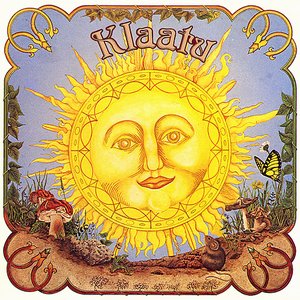Published on Jan 3, 2000
Just how popular were the Beatles? So popular that people would
believe that they were working incognito with – or, maybe,
were – a group shrouded in mystery, perhaps?
Back in 1976, a group known as Klaatu released their self-titled
debut album on an unsuspecting public. But enough people heard
similarities to the music from Klaatu – who were never identified
on the record jacket, and their label claimed they didn’t know who
was actually in the band – and the
Magical Mystery Tour-era work of the Fab Four that the
belief was tendered that Klaatu was either being assisted by
members of the Beatles, or even was the Beatles in some shape or
form.
The kicker to this story, as reader Eric Ness (who suggested
this review) correctly reminded me of, is that Capitol Records –
ironically, the same label of the Beatles – never denied the rumor.
(They never confirmed it, either.) This only served to add fuel to
the fire, and helped propel into the stratosphere a group that
otherwise we would never have heard of.
In the end, of course, the truth came out that Klaatu was only a
group of studio musicians from Canada – and the backlash against
them killed their future sales. They went on to record a total of
five albums (including one available only in Canada), and have only
stayed in the limelight thanks to stories about them in rock
encyclopedias and soundtracks like that for
Due South that used some of their music.
Sure, I could go into a review about how dated portions of this
album have become over the course of 24 years, or I could rip
certain aspects of it to shreds. Nah, that’s too easy. Or I could
go on and on about some of the wonderful conversations I’ve had
regarding Klaatu and some of the people who remember them fondly.
Instead, let’s look at the Beatles rumor and see how
Klaatu could have swung the vote either way.
The strongest argument for the Beatles rumor is on the song
“Sub-Rosa Subway,” which not only sounds like it has a Paul
McCartney bass line, but the vocal bears an uncanny similarity to
McCartney. Had I been caught up in this frenzy in 1976-1977 (and
had I not been six years old at the time), I would have said it was
quite possible that McCartney was doing an uncredited appearance.
After all, it was not unusual for McCartney to work with similar
groups such as Badfinger, and it was not implausible to believe
that he could have “gifted” Klaatu with an uncredited appearance.
The track itself is quite good, even if you don’t buy into the
McCartney theory.
And I’ll admit there are some sections on
Klaatu that remind me of songs like “Strawberry Fields
Forever”; just listen to the opening keyboard work on “Calling
Occupants” – a track better known as “Calling Occupants From
Interplanetary Craft”. (Just think, all these years I’ve been
blaming The Carpenters for this song.) But it’s here – ironically,
on the opening track – where the “Klaatu Is The Beatles” belief can
easily be broken down.
For starters, if the vocal is supposed to be like John Lennon,
it would sure help to have a Liverpool accent – hell, it’d help to
have
any accent. Second, while the Fab Four did do some cosmic
stuff in their past, I don’t think they’d have stooped to doing
songs about contact with aliens. (Then again, how else do you
explain “Revolution #9”?)
The Klaatu/Beatles correlation breaks down further on the
ridiculous songs like “Sir Bodsworth Rugglesby III” (hey, anyone
want to start a rumor that this one was actually assisted by Keith
Moon?) and “Anus Of Uranus” – what the hell was
that all about? Sure, the Beatles had a few moments of
levity in their music, especially around the “White Album” period
(or almost any song vocalized by Ringo Starr), but they seemed to
take their music more seriously than to do numbers like these.
What’s even more embarrassing is that you might find yourself
singing the chorus of this one at the most inopportune time. It’s
stupid, but catchy – and that is the most dangerous of musical
weapons.
What saves
Klaatu from total obscurity in my mind is that there are
some songs on this album that are quite good. The two that pop
immediately to mind are “California Jam” and “True Life Hero,” two
songs where it sounds like the band is fighting to establish their
own identity. And while I can appreciate the attempt to be “cutting
edge” on the closing track “Little Neutrino,” I thought they took
the synthesized vocals a little too far, and they could have
chopped about a minute or so off the ending, which tends to drag a
bit. Otherwise… not bad.
As for the secrecy the band members kept – well, you know the
old saying, “Any kind of publicity, even bad, is good publicity.”
Some bands have made a career out of keeping their true identities
hidden – how else would one explain the cult status of The
Residents? So, unlike the record-buying public who lashed out
against Klaatu once they found out the band wasn’t the Beatles, I
don’t hold that against them at all.
Klaatu is presently out-of-print, but is kind of intriguing
to listen to. However, I found when I listened to it to hear where
the tie with the Beatles came in, I could barely get through the
album. Once I listened to it on its own merits, I found more to
like about the album – enough to make me want to check out the
other titles in their discography.
Klaatu is by no means essential to own, but is interesting
for a diversion you might not otherwise have taken musically.
